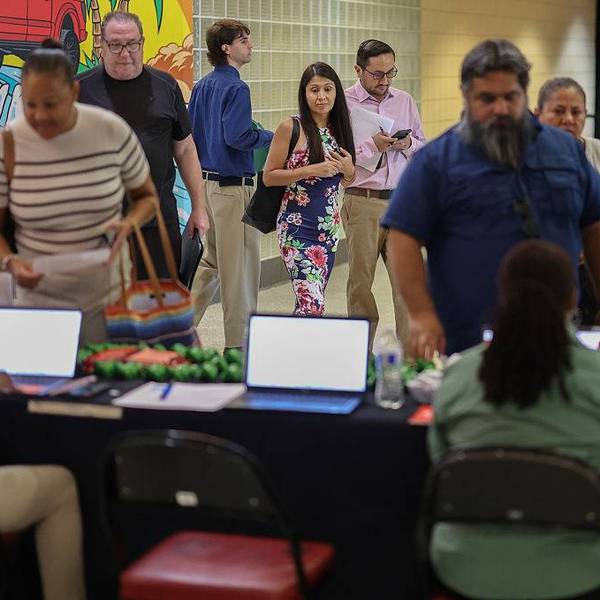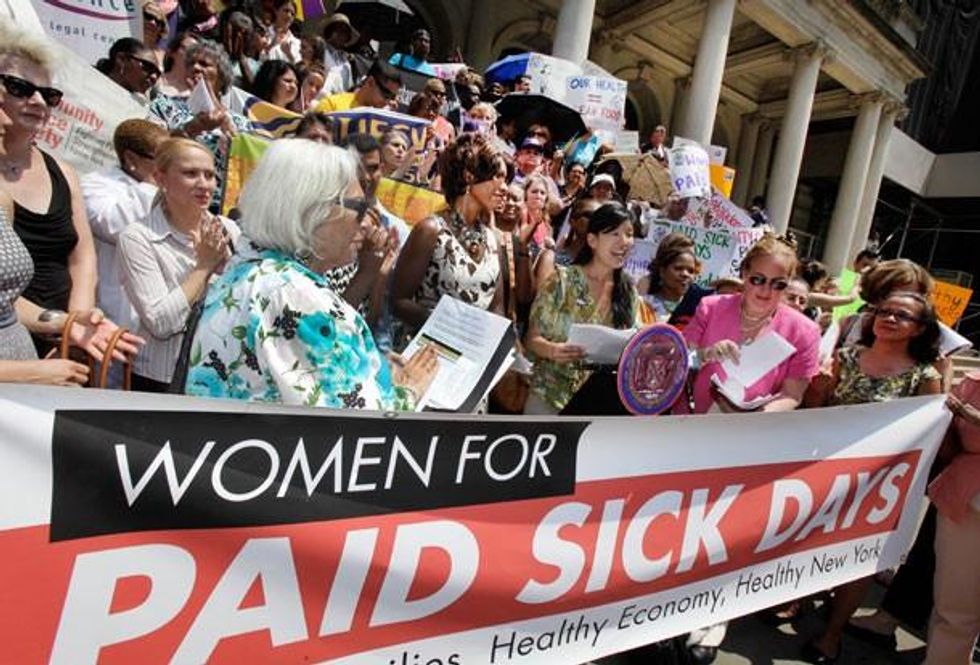Ian Rizzio was a 24-year-old mechanical engineering student in Portland, Oregon, managing a sandwich shop to pay his tuition. One day, he woke up sick, but went to work anyway, as he later testified to the Portland City Council. After vomiting in the bathroom, Rizzio spent two hours trying -- unsuccessfully -- to reach his boss before going home to rest.
When Rizzio came into work the next day, he was fired immediately. With $35,000 in student loans, he feared he'd have to withdraw from school.
Unfortunately, Rizzio is not alone.
More than 40 million Americans -- disproportionately low-income, black and Latino workers -- cook, clean, fold, and ring us up without any paid time off when they or their children are ill. On any given day, these workers must choose between caring for a sick child and their job. They handle our food and our purchases, coughing and sniffling through Kleenex, to avoid being handed a pink slip.
The absence of paid sick leave is a glaring injustice that puts American workers in the distinguished company of workers in Syria, Somalia and North Korea. It's an affront to our values and the dignity of a hard day's work. And it's a drag on our families, our businesses, and our society.
For all the vibrant national debate on work/life balance and encouraging women to "lean in" at their workplace, sometimes we need to make it easier for women and men--for all working adults--to stay home.
After all, should catching a cold really mean you could wind up out in the cold?
Many businesses claim that paid sick leave is another burdensome regulation -- part of some dastardly "mandate madness" -- but the truth is paid sick leave keeps workers and businesses healthy. Employees with sick leave are less likely to go to work sick. They're less likely to send their sick children to school or day care, where contagious kids can infect others. And they're less likely to wind up in the emergency room because they weren't able to visit a doctor during the day--leading to lower health-care costs for employers.
According to one study, offering U.S. workers seven paid sick days a year would save the American economy an estimated $160 billion annually in reduced turnover and increased productivity.
Fortunately, the push for paid sick leave has been picking up steam. Since 2006, when San Francisco became the first city to pass sick leave laws, Washington D.C. and Seattle have enacted their own versions of this humane, common-sense legislation. So has the state of Connecticut. Just a few weeks ago, the Portland City Council voted unanimously to require paid sick leave, thanks to the testimony and advocacy of Ian Rizzio and workers like him. The Philadelphia City Council has passed similar legislation, which Mayor Michael Nutter threatens to veto.
Despite the predictions of some critics, these laws haven't exactly brought businesses to their knees. After Connecticut passed its sick-leave law, employment actually rose in the most affected industries. The same happened in San Francisco -- where the service and hospitality sectors saw employment grow faster than in neighboring counties -- and where, during the Great Recession, more than 80 percent of employers surveyed said the law had no impact on their bottom lines.
But the latest -- and sweetest -- illustration of this movement's momentum comes from my hometown of New York City, where Democratic City Council Speaker and mayoral front-runner Christine Quinn had refused to bring a paid sick leave bill to a vote. For three straight years.
Some 39 of the 51 council members -- a clear majority -- supported the bill, which would have required businesses with more than five employees to offer five days of paid sick leave. Nearly three quarters of New Yorkers -- including 60 percent of Republicans -- said they would go even further and require employers to provide seven days of paid sick leave.
Yet Quinn, eager to court the city's pro-business elite -- and having accepting $370,000 in campaign contributions from sick-leave opponents -- held out, insisting she was protecting vulnerable small businesses in a shaky economic recovery.
So, as has been the story in every successful paid sick-leave campaign, New York organized. Feminist icon Gloria Steinem sent Quinn a strongly-worded letter, signed by 200 prominent women, from former Manhattan borough president Ruth Messinger to "Sex and the City" actress Cynthia Nixon. The besieged unions -- so accustomed these days to fighting a rear-guard action -- came out in full force, along with leaders in the black and Latino communities and prominent philanthropists like Jennifer Buffett. Diverse and determined groups, from the community service society to the working families party, put forward the intellectual arguments and the political strategy necessary for reform. And the Net roots -- especially younger feminist writers and bloggers -- galvanized the issue with the urgency it deserved.
This powerful grass-roots effort made paid sick leave the central issue in the Democratic mayoral primary, and ultimately made Quinn's position -- as the only Democratic candidate opposed -- a major liability. In the face of this pressure, Quinn relented last week and agreed to a compromise measure requiring businesses with at least 15 employees to provide five days of paid sick leave.
It's not a perfect bill, but it's proof of the power of a movement of everyday people whose cause is common sense and fair. And now, with Democratic Leader Nancy Pelosi and others calling for a federal Healthy Families Act that would establish national sick day standards, that movement has a chance to sweep the entire country.
America has reached a tipping point, and we're sick of waiting.




